06:42
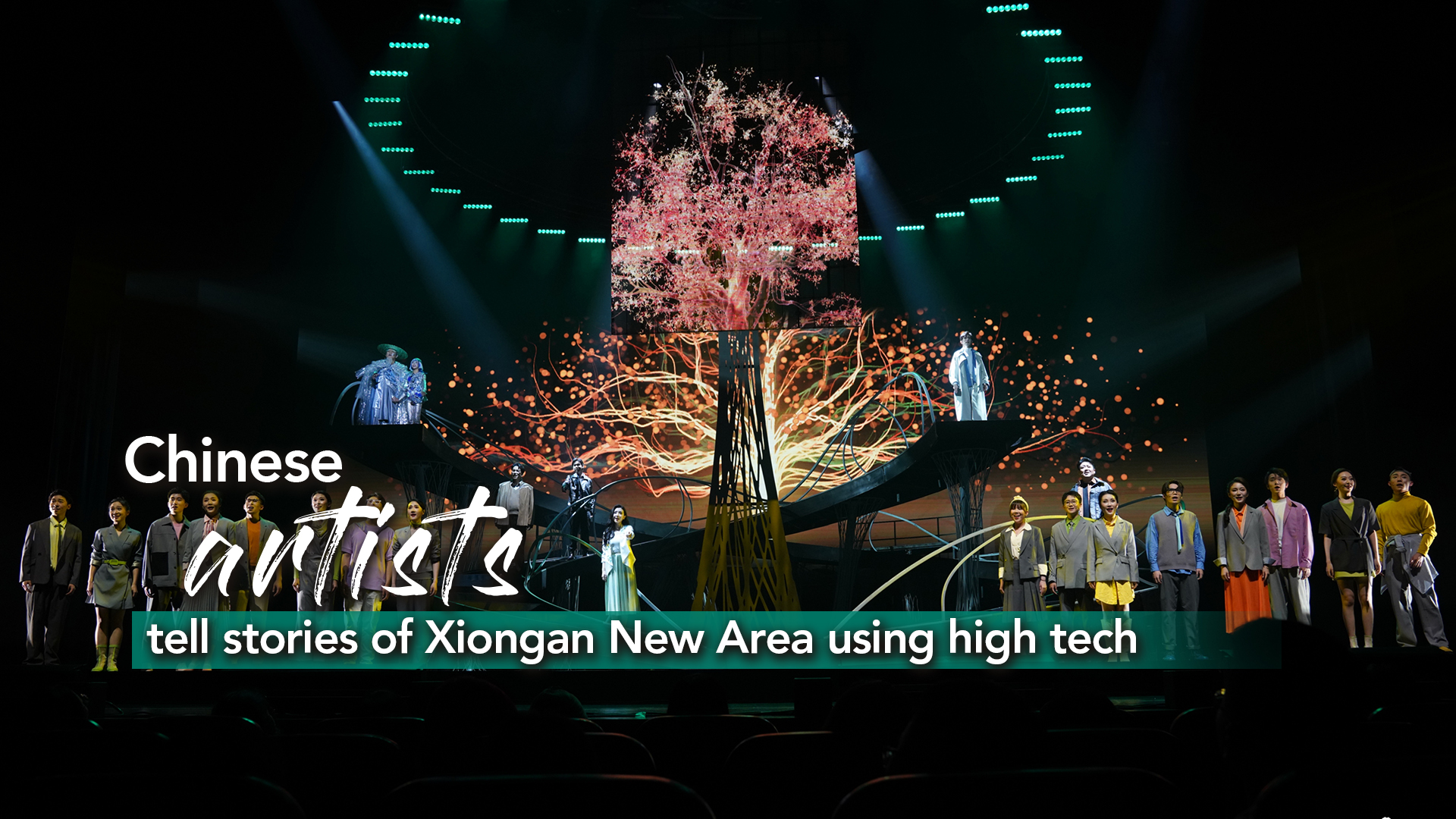
Intelligent, green, innovative, futuristic – these are tags for the Xiongan New Area of north China's Hebei Province, which is dubbed the "city of the future." Announced in 2017, the plan for the area aims to relieve Beijing of non-essential functions and advance the coordinated development of the Beijing-Tianjin-Hebei region.
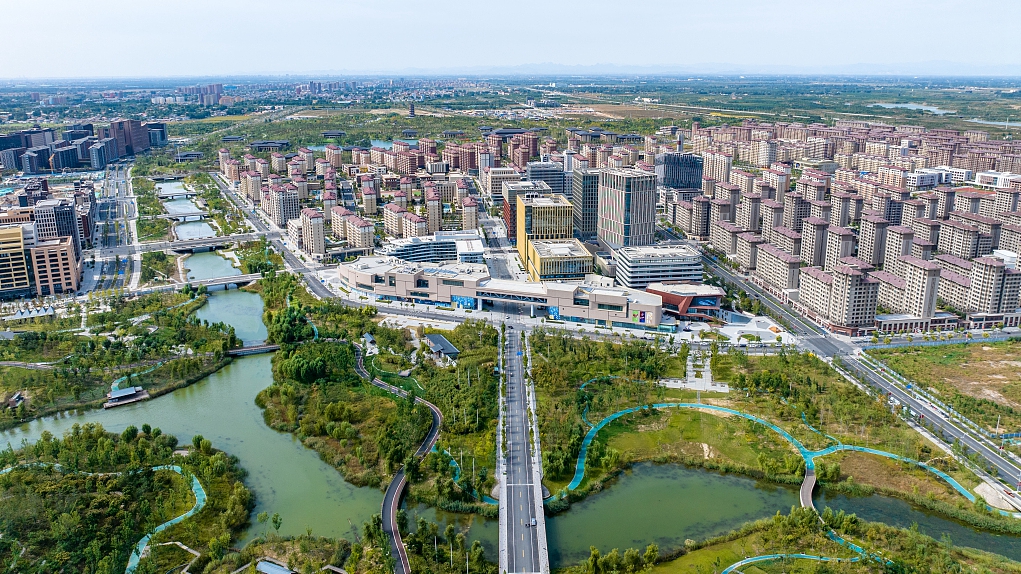
An aerial shot of China's Xiongan New Area, north China's Hebei Province, October 4, 2023. /CFP
An aerial shot of China's Xiongan New Area, north China's Hebei Province, October 4, 2023. /CFP
Now, a group of artists is telling the stories of the area and the people behind it through the musical "The City of Stars."
Premiered on September 28, the musical is based on the development and construction of the Xiongan New Area and tells the story of a group of young people struggling and creating in the area.
Xiongan has been described as "three cities" – the city in the cloud, the city aboveground and the city underground, which was depicted in the musical.
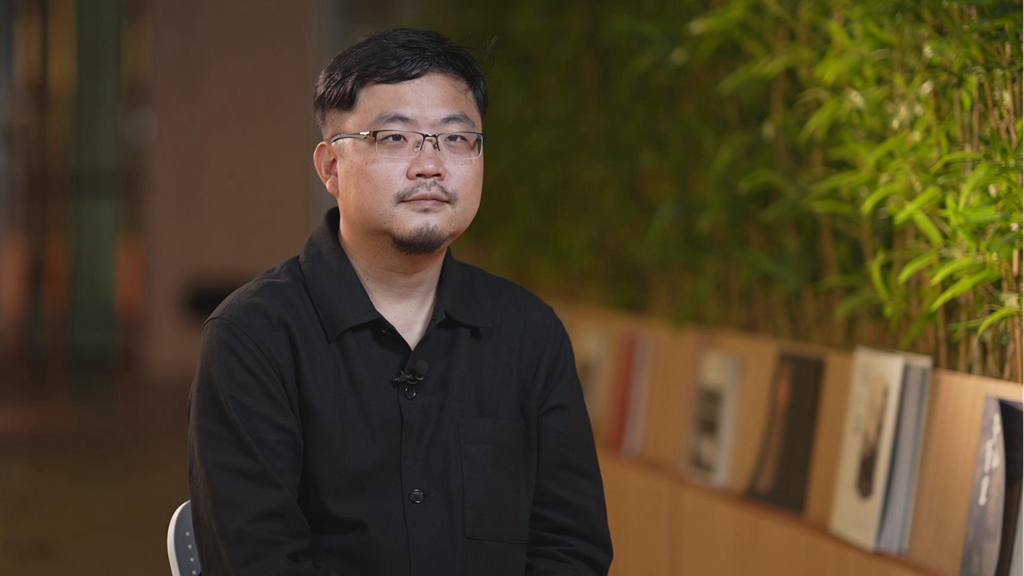
Wang Lingyun, scriptwriter of the musical "The City of Stars." /CGTN
Wang Lingyun, scriptwriter of the musical "The City of Stars." /CGTN
"The city in the cloud is the City Information Modeling (CIM) system, which integrates all the information above and underground," explained Wang Lingyun, scriptwriter of "The City of Stars."
"The city aboveground consists of the Orient gardens and ecological forests, which follow the concept of 'planting greenery first and then building the city of Xiongan.' And the city underground means the pipe network for solving 'urban diseases' and problems of waterlogging in China," said Wang.
The distinctiveness of the three cities can also be found in the music. Tan Xuan, music director and composer of the show, said that they used three music styles to run through the three layers of the city and form three distinct gradations.
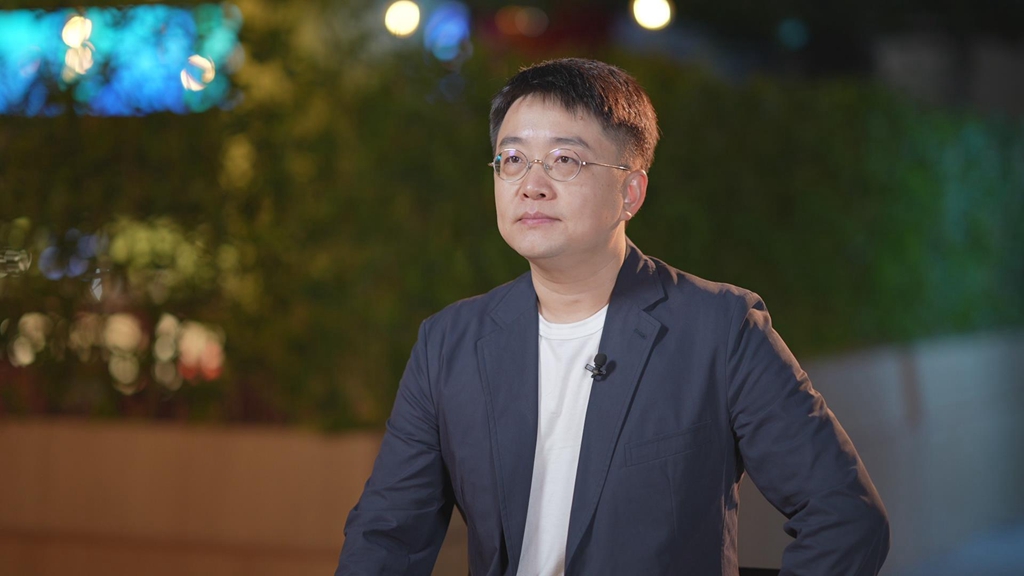
Tan Xuan, music director and composer of musical "The City of Stars." /CGTN
Tan Xuan, music director and composer of musical "The City of Stars." /CGTN
"For example, for the city in the cloud, the music has a sense of electronic technology. The city underground sounds like the electric guitar of a heavy metal band plus industrial noise. And the city above ground has instruments like harps and string music," Tan said.
There are archetypal characters for each city in the musical, and some lines even came from their dialogue, Wang said.
One of the main characters is the engineer of the cloud platform of the smart city, Li Xiang.
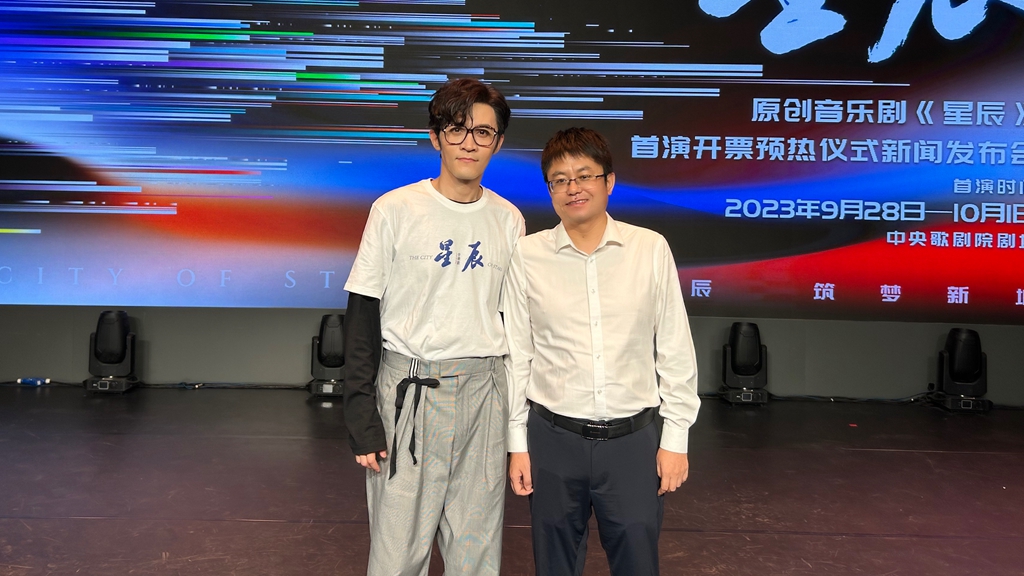
Zheng Qiyuan (L), the actor of Li Xiang, with his archetypal character Yao Kaixuan (R), at the press conference of musical "The City of Stars" held in Beijing, July 25, 2023. /China Oriental Performing Arts Group
Zheng Qiyuan (L), the actor of Li Xiang, with his archetypal character Yao Kaixuan (R), at the press conference of musical "The City of Stars" held in Beijing, July 25, 2023. /China Oriental Performing Arts Group
Zheng Qiyuan, the actor who brought Li Xiang to life, told CGTN that he talked with and watched his archetypal character, Yao Kaixuan, closely at the press conference of the musical held on July 25.
Yao, head of the Network and Information Security Department of China Xiongan Group's Digital City Company, is one of the 23 people to be stationed in Xiongan in 2017.
"I could feel that he is very persistent in his field of expertise, based on his temperament," said the actor. "I'm very touched by this group of people who have been contributing silently to the construction of the area."
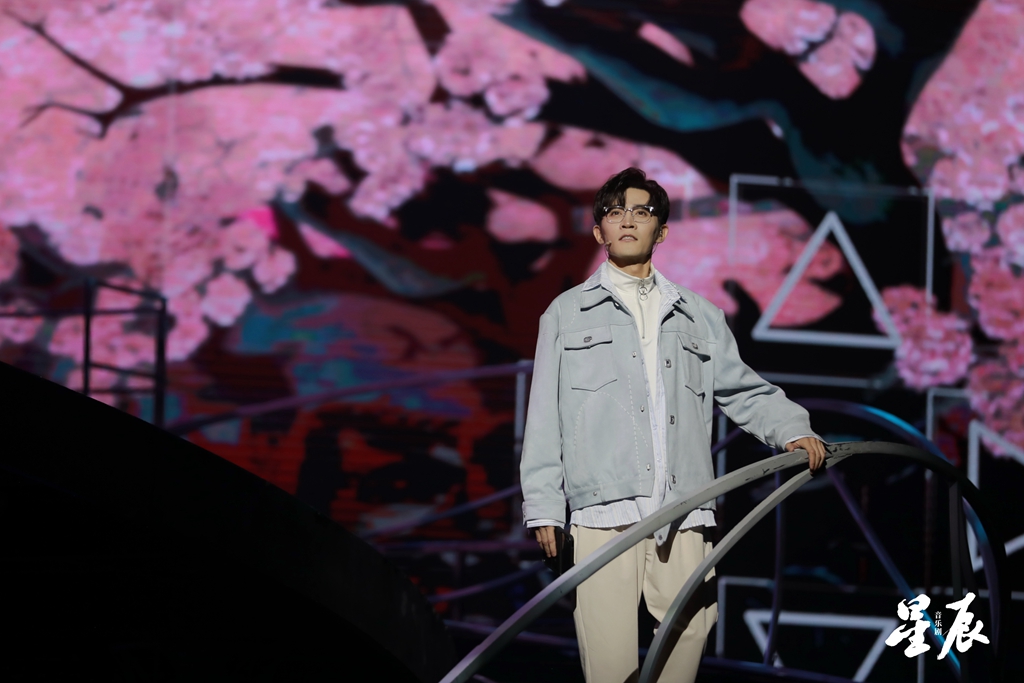
A stage photo of Zheng Qiyuan in "The City of Stars." /China Oriental Performing Arts Group
A stage photo of Zheng Qiyuan in "The City of Stars." /China Oriental Performing Arts Group
"I spent about half a year finding inspiration. In this short period, I witnessed significant changes in Xiongan," said Tan. "It changed every day."
The composer recalled seeing an indoor stadium the first time he was in Xiongan.
"It was just a steel-framed structure, but the stadium already had a certain scale the last time I went there," he said. "The shock of seeing it with your naked eyes made you exclaim the strong construction power of China."
Embracing technology while cherishing the power of the stage
To present the future smart city, the show used the virtual scenes of the metaverse and video games that are familiar to people born in the 1980s, 1990s, and 2000s.
"Is this kind of technology far away from us? No. We are even playing with them on our phones," said Wang. "So, I think modern people can accept this kind of presentation and it also gives the stage a new atmosphere."
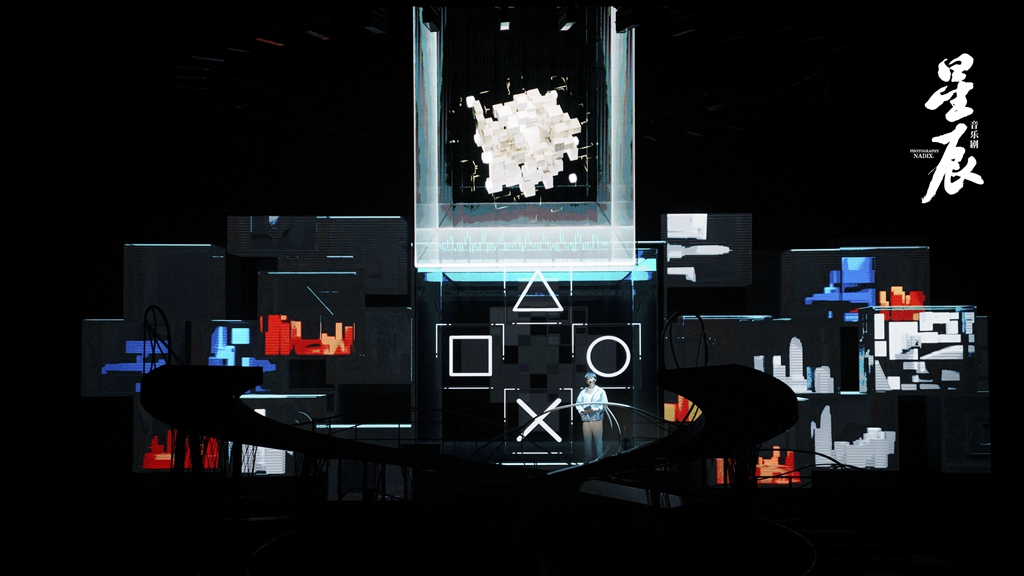
A stage photo of "The City of Stars." /China Oriental Performing Arts Group
A stage photo of "The City of Stars." /China Oriental Performing Arts Group
Zheng told CGTN that of the many shows he participated in, "The City of Stars" might have the most complex stage structure.
"The stage can rotate 360 degrees in the inner and outer circles at the same time. So, every degree of its movement creates a new scene," the actor described. "And with the laser and multimedia effects, it looks super cool."
The actor said he didn't expect to see that many technologies adopted in one show. "I believe future stage presentations must be very spectacular," he said.
"We will see the application of more multimedia and new means on stage. In the future, audiences might be able to interact with the stage with their phones and apps," said the scriptwriter, adding that while embracing all kinds of technologies on stage, they are also very traditional.
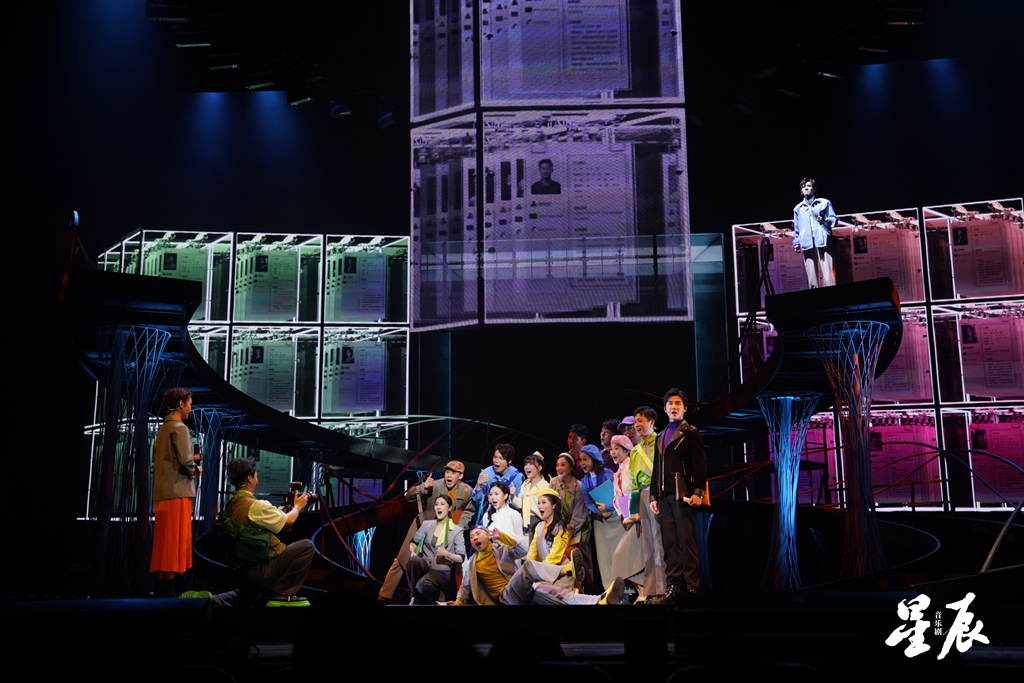
A stage photo of "The City of Stars." /China Oriental Performing Arts Group
A stage photo of "The City of Stars." /China Oriental Performing Arts Group
"We still believe in the stage, which conveys its energy directly to the audience," Wang said. "When you see an actual actor or actress, even if there is a flaw in his or her singing, it's real."
"We use all the technological means we can to improve the stage and convey our feelings, but we also cherish the relationships and emotions with the audience," he said.
Videographer: Guo Huakang
Video editor: Guo Meiping
Cover image: Yu Peng